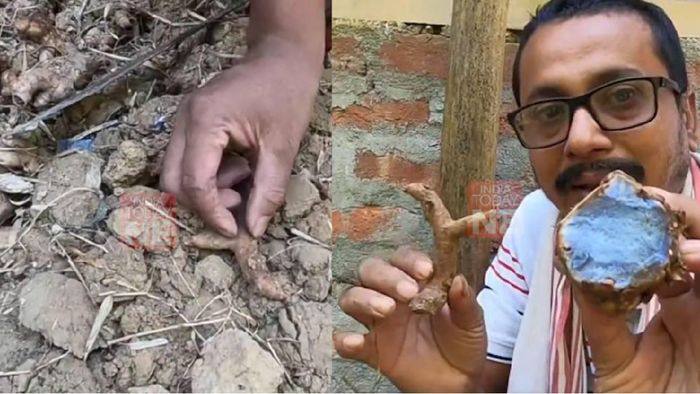Assam's Golaghat farmer on a mission to harness healing powers of 'Black Turmeric'
An Assam farmer from Golaghat is promoting the healing powers of 'Black Turmeric', a plant native to Northeast India. His mission aims at boosting its use for therapeutic benefits, sustainable farming and biodiversity conservation.

- Nov 18, 2023,
- Updated Nov 18, 2023, 6:52 PM IST
In the heart of Assam, where emerald-green landscapes stretch as far as the eye can see, an unassuming farmer, Probin Das from Golaghat has embarked on a mission that goes beyond cultivation — a mission fueled by the miraculous powers of black turmeric, known locally as 'Kola Halodhi'. Speaking to India Today NE, Probin Das opened up about his journey, turning the spotlight on a herb that holds the promise of health and healing.
"It's more than just farming; it's a social service," Probin declared, reflecting on his motivation to delve into the cultivation of black turmeric. His conviction stems from personal experience. Suffering from persistent stomach problems, he turned to black turmeric at his mother's suggestion. "Within a few minutes, I got relief," he reminisced. This pivotal moment marked the beginning of his journey into not just cultivating black turmeric but also distributing its seedlings for free, aiming to share the healing benefits with his community.
The medicinal prowess of black turmeric is not a newfound discovery. Passed down through generations, this herb has been a staple in traditional medicine. "For stomach problems, gas problems, body pain, a few drops of liquified turmeric can be ingested to cure such diseases," Probin explained. He further revealed its application for injuries, where it is ground and mixed with mustard oil, serving as a potent balm. "In case of some injury, it is grinded and mixed with mustard oil and is put on the injury. It is also used for digestion problems," he shared.
Despite its potential, black turmeric remains relatively unknown, shrouded in myths and misconceptions. The farmer expressed concern about the herb being used for wrong purposes, contributing to its absence in the commercial market. "There is a hype among the people that this turmeric is used for wrong causes, and that is why it couldn't manage to grab the commercial market," Probin lamented.
The color of the turmeric adds to its mystique, varying with the land but predominantly presenting a captivating blue hue. Probin said that this unique characteristic is a proof of the herb's purity and potency. "The colour varies with the land, but most of it is blue in colour," he shared, offering a glimpse into the aesthetic allure of the black turmeric fields.
In the broader context of herbal medicine, Probin's insights into the potential of black turmeric extend beyond local applications. "From the internet, I got to know that many medicines are being made from this, including cancer treatment medicine," he revealed.
Yet, the journey has not been without its hurdles. The lack of official recognition from the government has restrained Probin from scaling up production. "This plant hasn't received any official recognition from the government, so I haven't chosen to harvest it on a large scale," Probin explained.
Adding credibility to his claims, the farmer highlighted the covert use of black turmeric by prominent ayurvedic brands. "Many well-known ayurvedic brands of India are secretly using this item in their medicines, but they didn't disclose the fact," he asserted.
Over the span of five years, Probin has cultivated 6-7 quintals of black turmeric. The slow maturation process, spanning almost a year, adds to its value, particularly for medical purposes. "It took almost 1 year to mature, and if it is kept for 2 years, it becomes more valuable in terms of medical purpose," he shared.
However, the lack of government response has left Probin disheartened. "I haven't received any kind of response/help from the Government yet," he disclosed, echoing the sentiments of many agricultural innovators who often find themselves facing bureaucratic barriers.